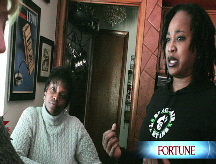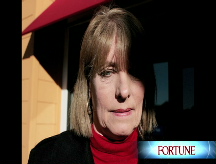Job hunting for introverts
If networking drives you nuts and you tend to think a while before you respond to interviewers' questions, you may find a job search especially difficult. Here's what to do.

(Fortune) -- Dear Annie: I lost my job as an IT manager in a downsizing last November and am still looking for another one. Apart from the fact that the tech job market is pretty flat right now, and employers seem to be taking a wait-and-see approach to hiring, I think my personality is getting in my way.
I know I'm supposed to be networking, and I'm trying, but I find it exhausting, and I'm aware that I often don't come across well in a crowd of people I don't know. Also, in the few interviews I've managed to get, I've been asked some interesting questions that required some thought, and I got the impression that I took too long to answer them. My wife says I'm a classic introvert and that this is making my job hunt harder than normal. Your thoughts? -Sudoku Samurai
Dear Samurai: Sounds as if your wife is familiar with a personality test widely used in business called the Myers Briggs Type Indicator, which identifies introversion as a specific personality type. One clue: You find networking exhausting. Another hint: You're inclined to think carefully before you speak.
"In everyday language, people often use the words 'shy' and 'introverted' interchangeably," notes Wendy Gelberg, a career coach whose firm Gentle Job Search/Advantage Resumes (www.gentlejobsearch.com) has been advising introverted executives since 1979. "But introverts are not necessarily shy." Rather -- in contrast to their extroverted opposites -- introverts are more focused on what's inside their own heads than on what's happening around them, and they are refreshed and energized by solitude. Extroverts direct their attention outward and get charged up by having other people around. Says Gelberg: "After spending a few hours or a whole day with others, an introvert needs to withdraw and be alone for a while, while an extrovert will be saying, 'Let's party!' "
Gelberg wrote a book you might want to check out, The Successful Introvert: How to Enhance Your Job Search and Advance Your Career (Happy About, $19.95). She observes that introverts, among whom she counts herself, usually assume that introversion is, well, kind of weird.
"We tend to feel that extroversion is the gold standard, that it's more 'normal,' " she says. "But that's because it's all we see, on TV and elsewhere. After all, a television show about someone just sitting quietly or reading a book wouldn't draw many viewers. And then, as introverts, we don't get together and share our experiences, so we assume we're all alone."
Far from it. Research analyzing the results from a national representative sample of 3,009 people who have taken the Myers Briggs test shows that introverts actually outnumber extroverts, 50.8% to 49.3%. More men (54.1%) than women (47.5%) are introverted. And lest you think the title of Gelberg's book is an oxymoron, consider this: Berkshire Hathaway (BRKA, Fortune 500) CEO Warren Buffett, Microsoft (MSFT, Fortune 500) chairman Bill Gates, Sara Lee (SLE, Fortune 500) CEO Brenda Barnes, Steven Spielberg, and Charles Schwab all describe themselves as introverts.
The job-search process, alas, often seems to favor the extroverted, but you can prevail. First, let's take those interviews where (you think) you haven't spoken up quickly enough. Gelberg says that modern neuroscience has pinpointed one difference between introverts and their opposites: PET scans of both kinds of brains show the two types process information differently, with introverts tending to think before speaking and extroverts thinking while they talk.
"In a job interview, you can overcome this difference by preparing thoroughly beforehand," says Gelberg. "Most people, especially extroverts, go into an interview and 'wing it.' For you, a better approach is to think hard beforehand about what questions you are likely to be asked, and have your answers ready." Take a pad and paper with you, she suggests, not just to take notes but also "to give yourself prompts. Write down key words and phrases to remind yourself of what you planned to say."
What if, in spite of your best efforts in advance, the interviewer throws you a curve ball? "You can say, 'That's a good question, let me think about it for a minute.' Then do," says Gelberg. Try to come up with an answer as quickly as you can -- but bear in mind that any job interview is a two-way street. A corporate culture that discourages cogitation may not be one where you'd be comfortable in the long run.
Another tip: Make full use of an advantage your introversion gives you, which is the inclination to do detailed research. "Everyone should do their homework before a job interview, but extroverts usually don't," observes Gelberg. You, on the other hand, probably relish the prospect of studying the corporate Web site, seeking out the press the company has gotten lately, Googling your interviewer, and generally gathering as much information as you can find before you go in. "Employers love this, because it shows you are interested in their company, not just desperate for a job," she says. "It will often give you a real edge."
As for your other bugaboo, networking, Gelberg recommends that you accept the fact that you have to pace yourself. "Since it's hard for you to shine in a big gathering, you need to give yourself more time in between them than an extrovert would," she says. "Be more selective, too. Instead of hitting every single event you could go to, think strategically and go to just those get-togethers that are most likely to be truly worthwhile."
When it comes to making professional connections, Gelberg notes, the Internet may be an introvert's best friend. "Social networking sites like LinkedIn, blogs, and chat rooms are all great for introverts because you get to think and choose your words before you 'speak,' " she points out. "One reason for the huge growth of online networking is that it plays to introverts' strengths. You can 'meet' and be in contact with large numbers of people without the strain of spending time with them in person."
Readers, what do you say? Do you consider yourself to be an introvert or an extrovert? Do you agree that job hunting is easier for extroverts? If you're introverted, have you got any tips on what worked for you in your last job hunt? Would you rather work for an introvert or an extrovert? Post your thoughts on the Ask Annie blog. ![]()
-
 The retail giant tops the Fortune 500 for the second year in a row. Who else made the list? More
The retail giant tops the Fortune 500 for the second year in a row. Who else made the list? More -
 This group of companies is all about social networking to connect with their customers. More
This group of companies is all about social networking to connect with their customers. More -
 The fight over the cholesterol medication is keeping a generic version from hitting the market. More
The fight over the cholesterol medication is keeping a generic version from hitting the market. More -
 Bin Laden may be dead, but the terrorist group he led doesn't need his money. More
Bin Laden may be dead, but the terrorist group he led doesn't need his money. More -
 U.S. real estate might be a mess, but in other parts of the world, home prices are jumping. More
U.S. real estate might be a mess, but in other parts of the world, home prices are jumping. More -
 Libya's output is a fraction of global production, but it's crucial to the nation's economy. More
Libya's output is a fraction of global production, but it's crucial to the nation's economy. More -
 Once rates start to rise, things could get ugly fast for our neighbors to the north. More
Once rates start to rise, things could get ugly fast for our neighbors to the north. More









